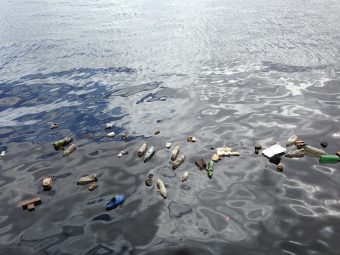
A fishing town on the southwest tip of India is showing what a community can achieve when it decides to face an environmental problem and turn it into a solution, using ocean plastics to empower women and literally build roads to a better future.
In an inspiring profile on the town of Kollam in the southernmost Indian state of Kerala, National Geographic spoke with fisherman Xavier Peter. Peter has harvested fish and shrimp for three decades, but recently the uptick in plastic pollution has made his job much harder. Peter said he and his crew often pull up more plastic than fish and can spend hours separating it from their catch and nets.
“Pulling the nets out of the water is extra effort, with all this plastic tangled in them,” he said. “It’s a bit like trying to draw water from a well—your bucket is somehow being weighed back down.”
The region had no recycling facility or waste collection, so, for a long time, the fisherman thought all they could do was complain and throw the plastic back into the water. Then Peter Mathias, a leader of a union for fishing boat owners in the region, decided he had heard enough complaints from fellow fisherman and decided to do something about it.
“It is affecting our work,” Mathias told National Geographic. “So in this way it’s our responsibility, and necessary for our survival as fishermen to keep the sea clean.”
In summer of 2017, he asked state minister of fisheries J. Mercykutty Amma if she could set up a way to recycle the plastic that fisherman hauled in. She, in turn, reached out to five other government departments.
The department of civil engineers agreed to build a recycling plant and the department for women’s empowerment found female workers to make the plant run, offering the women a chance to earn money in an economic landscape where most jobs, like fishing, are seen as male.
Now, Peter and 5,000 other fisherman collect all the plastic caught in their nets and, instead of tossing it back, bring it to shore to be recycled. Since August 2017, they have collected 65 metric tons (approximately 71 U.S. tons). Thirty women then work to clean and sort the plastic. Since much of it is too degraded to be traditionally recycled, it is shredded and sold to road crews to strengthen their asphalt.
The program has already had a positive impact. The fisherman said they have noticed a decline in the amount of plastic in their nets. And the program is spreading around the region. The organizers have helped other fishing communities raise funds to build their own recycling plants, including a clam diving community who had tried to collect plastic previously only to give up when they had no way to dispose of it.
“]Fisherman] through all of Kerala, all of India, and all of the world will join us,” Mathias told National Geographic.
Source: Eco Watch
